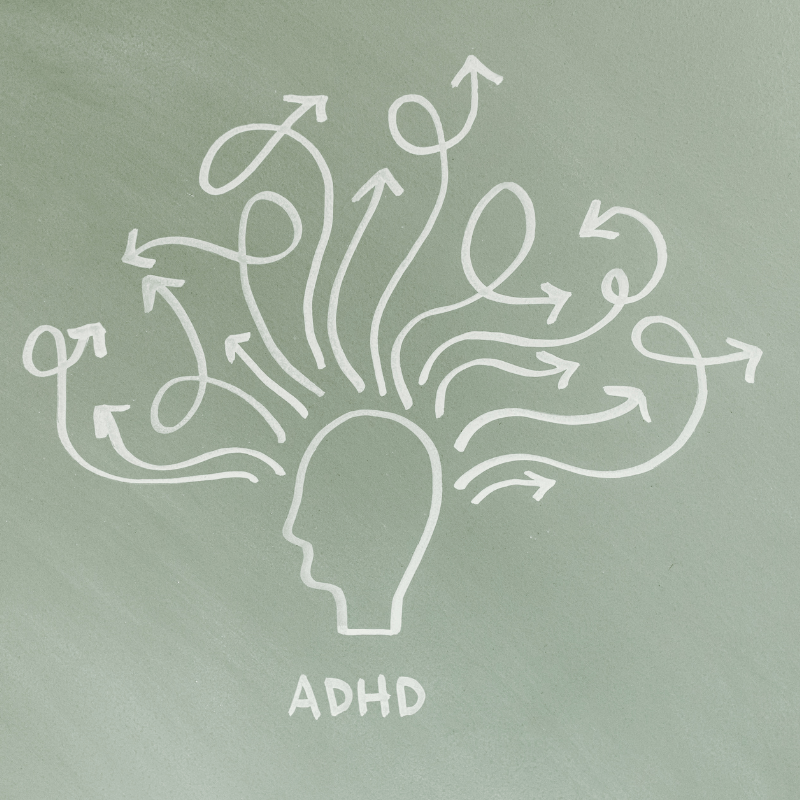Psychological evaluations include
ADHD Assessment
Requires 3-5 hours in person, usually completed in 1-2 sessions. Total time 6-8 hours.
Attention Deficit/Hyperactivity Disorder (ADHD) is a neurodevelopmental disorder characterized by symptoms such as inattention, hyperactivity, and that can significantly impact a person's daily functioning. It affects 13% of teenagers and 4.4% of adults across United States (cdc.gov).
There are three main types of ADHD:
- Predominantly inattentive
- Predominantly hyperactive/impulsive
- Combined type

The hallmarks of ADHD include:
- Inattention: difficulties paying attention and staying focused on tasks or activities; difficulties organizing tasks, paying attention to details, and following instructions; trouble staying organized and frequently losing things.
- Hyperactivity: excessive and often restless physical activity; a constant need to move, fidget, or excessive talking; difficulty sitting still, particularly in situations that require to be quiet or calm.
- Impulsivity: acting without thinking about the consequences; difficulty controlling impulses, resulting in impulsive behaviors such as interrupting others, blurting out answers, or engaging in risky activities without considering the potential dangers (reckless driving, unsafe sex, spending, etc.)
ADHD is not a learning disability or emotional problem, but it can co-occur with learning disabilities and mood disorders.
How does ADHD look like?
Teenagers with ADHD may appear lazy, absentminded, impulsive, easily distracted, cannot sit still, leave unfinished homework or tasks at home, and may have difficulties in social relationships.
Adults with ADHD may experience personal and professional problems, due to inability to meet goals. They may have issues completing work, inability to sit for long periods of time, low self-esteem, memory problems, anxiety, and depression.
ADHD Evaluation
ADHD testing typically involves a comprehensive assessment conducted by a qualified professional (PsyD, PhD, MD) to gather information about your symptoms and behavior patterns, and how they impact important aspects of your life.
To better make an accurate diagnosis, our approach to ADHD assessments includes,
1. Clinical Interview (1-2 hours). Questions about your symptoms, history, and any challenges you may be experiencing. This includes behavioral observations, medical and developmental history. This helps ensure that an ADHD pattern exists and rule out other possible causes of your symptoms, such as anxiety, depression, and mild cognitive impairment due to Long Covid for example.
2. Standardized inventories and questionnaires completed by you, a family member and/or other relevant people in your life (1-2 hours). These are used to collect information about ADHD symptoms, the severity, and the impact on your daily life.
3. Psychological testing (3-4 hours), to assess cognitive functioning, attention, executive skills, and other relevant psychological factors, to have additional insights into your strengths and weaknesses.
4. Feedback session (30-45 minutes) to discuss the results of the test and treatment recommendations.
ADHD testing helps determining an accurate diagnosis to develop treatment strategies, such as medication options, behavioral interventions, and work/academic accommodations, to manage your symptoms, improve overall functioning and have quality of life.
Career Assessment
A career assessment helps you better understand yourself, what are your interests, work values, personality strengths and work skills. When you gain insight into your unique talents and motivations, you can make more informed decisions about your future and career path.
Some young adults may encounter challenges and struggles during their first couple of years in college as they try adjust to higher academic rigor and colleges demands. Their increased workload and additional pressure can make them feel stressed. Being away from home, and far from family support system can make them feel homesick and lonely. In addition to increased financial stress that they may have as they try to balance work responsibilities with academic demands.
Others may have problems adjusting socially to a larger group of people from different backgrounds and cultures. Their mental health may suffer, and develop anxiety, depression or other emotional issues. Some others enter college without a clear understanding of their career aspirations. Their uncertainty can make it even more challenging to cope with college demands and life in general. They may feel overwhelmed, confused and unsure about their career choices.

A career assessment helps expand knowledge, realize possibilities and expose to a wider range of career/job options that may have not been considered before. It can give you the direction and focus that you need, after feeling overwhelmed, by narrowing down choices based on your preferences and interests that best fit you. When you have a clear understanding of your career interest and your strenghts, you can set realistic short-term and long-term goals aligned with your aspirations. A career assessment can also help building your confidence and your resilience, by knowing your choices and the challenges you may face.
A career assessment includes one hour of general/vocational interview, brief mental status exam, inventories to assess behavior, mood, personality and a thorough career evaluation to explore abilities, personal skills, work values and vocational interests. The results may provide guidance on suitable career options and help you explore occupations that align with their unique attributes and aspirations.
Therapists Offering Psychological Testing

